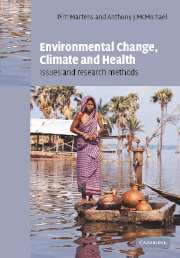Book contents
- Frontmatter
- Contents
- List of contributors
- Foreword
- 1 Global environmental changes: anticipating and assessing risks to health
- 2 Historical connections between climate, medical thought and human health
- 3 The contribution of global environmental factors to ill-health
- 4 Surprise, nonlinearity and complex behaviour
- 5 Epidemiological and impacts assessment methods
- 6 Retrospective studies: analogue approaches to describing climate variability and health
- 7 Detecting the infectious disease consequences of climate change and extreme weather events
- 8 Integrated Assessment modelling of human health impacts
- 9 Remote sensing, GIS and spatial statistics: powerful tools for landscape epidemiology
- 10 Monitoring the health impacts of global climate change
- 11 Epidemiology, environmental health and global change
- 12 Dealing with scientific uncertainties
- Index
- Plate section
- References
12 - Dealing with scientific uncertainties
Published online by Cambridge University Press: 28 July 2009
- Frontmatter
- Contents
- List of contributors
- Foreword
- 1 Global environmental changes: anticipating and assessing risks to health
- 2 Historical connections between climate, medical thought and human health
- 3 The contribution of global environmental factors to ill-health
- 4 Surprise, nonlinearity and complex behaviour
- 5 Epidemiological and impacts assessment methods
- 6 Retrospective studies: analogue approaches to describing climate variability and health
- 7 Detecting the infectious disease consequences of climate change and extreme weather events
- 8 Integrated Assessment modelling of human health impacts
- 9 Remote sensing, GIS and spatial statistics: powerful tools for landscape epidemiology
- 10 Monitoring the health impacts of global climate change
- 11 Epidemiology, environmental health and global change
- 12 Dealing with scientific uncertainties
- Index
- Plate section
- References
Summary
That the unknown is like the known makes science possible; that it is also unlike the known makes science necessary. This conflict is the reason that all theories are eventually proven to be wrong, limited, irrelevant, or inadequate.
Levins, 1995Introduction
The study of global environmental change and its current and potential health impacts encounters uncertainties at many levels. These have profound implications for the form and content of science, scientific communication and policy-making. Indeed, it was in the course of the first substantive formal international discussion of these large-scale environmental issues, at the 1992 UN Conference on Environment and Development (the “Rio Conference”), that the Precautionary Principle was clearly enunciated and endorsed. That principle states, in essence, that scientific uncertainty in relation to a phenomenon with potentially serious, perhaps irreversible, consequences does not justify lack of preventive action.
During the past decade, the important role of uncertainty has become especially evident in the scientific and public debate around global climate change and its impacts upon human societies and population health. In each such discourse, pertaining to global environmental changes, there is continuing debate about the nature and quality of the scientific evidence for both the process and its impacts; about the relevance and legitimacy of multi-decadal-length modelling predictions; about the assumptions that can or should be made about future human societies and their capacity to handle changed circumstances; about the extent to which the medium to distant future should be discounted; about moral obligations between rich and poor nations and between present and future generations; about the extent to which decisions can be made within an orthodox economic framework by assigning money values to all present and future variables in the equations; and about the decision-making structures and forms of international governance appropriate to this type of large-scale phenomenon.
- Type
- Chapter
- Information
- Environmental Change, Climate and HealthIssues and Research Methods, pp. 311 - 333Publisher: Cambridge University PressPrint publication year: 2002
References
- 2
- Cited by

